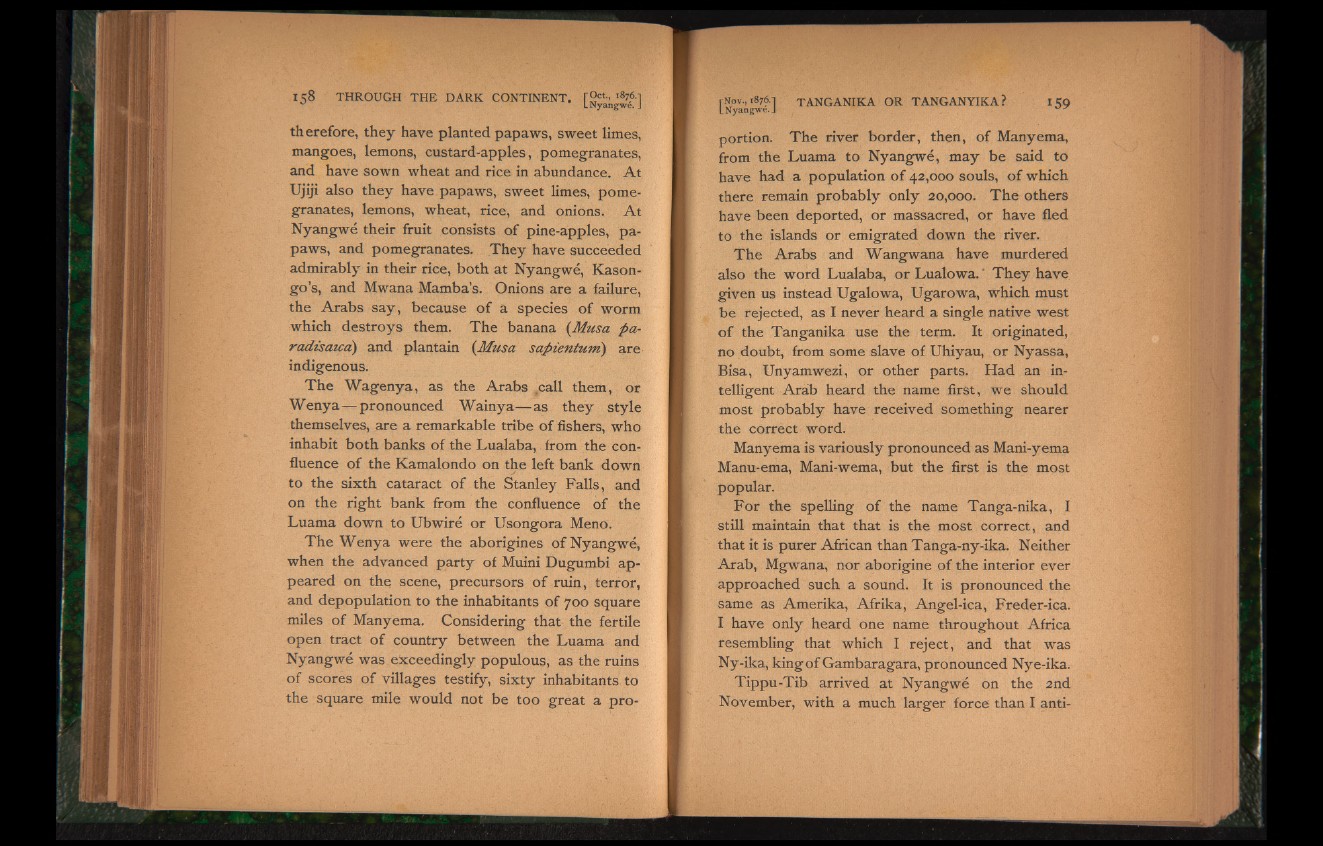
1 5 8 THROUGH THE DARK CONTINENT. rS01- i87-61 L Nyangwe. J
therefore, they have planted papaws, sweet limes,
mangoes, lemons, custard-apples, pomegranates,
and have sown wheat and rice in abundance. At
Ujiji also they have papaws, sweet limes, pomegranates,
lemons, wheat, rice, and onions. At
Nyangwe their fruit consists of pine-apples, papaws,
and pomegranates. They have succeeded
admirably in their rice, both at Nyangwe, Kason-
go’s, and Mwana Mamba’s. Onions are a failure,
the Arabs say, because of a species of worm
which destroys them. The banana (Musa pa-
radisaica) and plantain (Musa sapientum) are
indigenous.
The Wagenya, as the Arabs ,call them, or
Wenya — pronounced Wainya— as they style
themselves, are a remarkable tribe of fishers, who
inhabit both banks of the Lualaba, from the confluence
of the Kamalondo on the left bank down
to the sixth cataract of the Stanley Falls, and
on the right bank from the confluence of the
Luama down to Ubwire or Usongora Meno.
The Wenya were the aborigines of Nyangwe,
when the advanced party of Muini Dugumbi appeared
on the scene, precursors of ruin, terror,
and depopulation to the inhabitants of 700 square
miles of Manyema. Considering that the fertile
open tract of country between the Luama and
Nyangwe was exceedingly populous, as the ruins
of scores of villages testify, sixty inhabitants to
the square mile would not be too great a prorNov.,
1876.-1 TANGANIKA OR TANGANYIKA? 159
L Nyangwe. J y
portion. The river border, then, of Manyema,
from the Luama to Nyangwe, may be said to
have had a population of 42,000 souls, of which
there remain probably only 20,000. The others
have been deported, or massacred, or have fled
to the islands or emigrated down the river.
The Arabs and Wangwana have murdered
also the word Lualaba, or Lualowa.' They have
given us instead Ugalowa, Ugarowa, which must
be rejected, as I never heard a single native west
of the Tanganika use the term. It originated,
no doubt, from some slave of Uhiyau, or Nyassa,
Bisa, Unyamwezi, or other parts. Had an intelligent
Arab heard the name first, we should
most probably have received something nearer
the correct word.
Manyema is variously pronounced as Mani-yema
Manu-ema, Mani-wema, but the first is the most
popular.
For the spelling of the name Tanga-nika, I
still maintain that that is the most correct, and
that it is purer African than Tanga-ny-ika. Neither
Arab, Mgwana, nor aborigine of the interior ever
approached such a sound. It is pronounced the
same as Amerika, Afrika, Angel-ica, Freder-ica.
I have only heard one name throughout Africa
resembling that which I reject, and that was
Ny-ika, king of Gambaragara, pronounced Nye-ika.
Tippu-Tib arrived at Nyangwe on the 2nd
November, with a much larger force than I anti